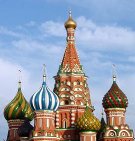 The gravest danger to religious freedom in Russia comes from the Kremlin’s approach to combating extremism, writes Geraldine Fagan of Forum 18
The gravest danger to religious freedom in Russia comes from the Kremlin’s approach to combating extremism, writes Geraldine Fagan of Forum 18
The odd one out in the latest update to Russia’s Federal List of Extremist Materials, announced on 29 August, might be the Russian translation of Hugh Trevor-Roper’s Hitler’s Table Talk. Coming in at No 221, after being banned by a court in Lenin’s home town of Ulyanovsk in June, the book is one of only a handful of items on the list not banned on religious grounds. Charges of religious extremism pose the gravest threat to religious freedom in Russia today, and their use to restrict religious activity is gathering pace.
The June 2002 extremism law’s lengthy definition of extremism contains a number of clauses describing such activity in a religious context: incitement of religious hatred; promotion of the exclusivity, superiority or inferiority of citizens according to their attitude towards religion or religious affiliation; obstruction of the lawful activity of religious associations accompanied by violence or the threat of violence, and committing a crime motivated by religious hatred.
While such formulations may seem sound, Russia’s track record in seeking to apply them is a concern.
In June 2008, a Moscow district public prosecutor issued an extremism warning to a local Baptist pastor without specifying its grounds for doing so. In May 2008, the public prosecutor’s office in the town of Asbest (Sverdlovsk Region) issued warnings to a local Jehovah’s Witnesses community on the same grounds. In late 2007, the authorities in Rostov-on-Don Region ordered investigations into local communities of Jehovah’s Witnesses after an expert literary analysis declared some of their well-known tracts extremist.
For local human rights defenders, the February 2003 ban of the radical Islamic group Hizb-ut-Tahrir was a wake-up call. Subsequent prosecutions of dozens of alleged Hizb-ut-Tahrir members across Russia hinged not on proven participation in terrorist acts, or even membership of the organisation, but the content of the group’s literature alleged to have been circulated by suspects. In a 2005 case in Tobolsk (Tyumen Region), for instance, five young Muslims were handed down sentences ranging up to six years for extremism, as well as aiding and abetting terrorism, solely on the basis of literary evidence. In assessing this literature, a former scientific atheism lecturer concluded that its ‘call to the universal Islamisation of humanity signifies nothing less than propaganda for coups d’etat and violent change in the state and order of every country’. Vladimir Viktorov also maintained that the literature ‘propagandises the idea of the superiority of Islam, and therefore Muslims, over other religions and the people who adhere to them’.
This formulation features prominently in every subsequent ban or attempt to ban allegedly religious extremist literature known to Forum 18. Its flaw is to confuse promoting the superiority of citizens holding to a particular religious belief — defined as extremism by the 2002 law — with propaganda concerning the superiority of the religious belief itself, a fundamental tenet of religious freedom.
The trials of suspected Hizb-ut-Tahrir members heralded a move towards banning more mainstream Islamic literature. Previously, in early 2003, assertions about the supposedly extremist nature of declaring the superiority of a faith by the very same former scientific atheism lecturer, Vladimir Viktorov, failed even to reach court in Yekaterinburg (Sverdlovsk Region).
Four years on, however, the text at issue in that instance — Muhammad Ali al-Hashimi’s The Personality of a Muslim — was banned as extremist by Buguruslan City Court (Orenburg Region). The work is a manual of Quran-based etiquette whose sole emphasis is on kindness and generosity, including towards non-Muslims. In May 2008, a criminal case was opened against the head of Moscow Islamic University’s publishing department, Aslambek Ezhayev, for distribution of The Personality of a Muslim.
A similar turnaround — securing a previously unsuccessful prosecution attempt — involves the work of moderate Turkish theologian Said Nursi (1876-1960). In April 2005, a court in the Siberian city of Omsk failed to convict a local Muslim of religious extremism for distributing ‘Fruits of Faith’, one part of Nursi’s Risale-i-Nur (‘Messages of Light’). In May 2007, however, a Moscow court sitting in closed session banned all parts of Risale-i-Nur in Russian translation, again relying solely upon literary analysis by psycholinguists and linguists. A group of women who form a study group centred on Nursi’s works in the Russian republic of Tatarstan complained to Forum 18 that they were hounded by the local FSB security service for two years as a prelude to the ban, suffering raids, book confiscations and forced psychiatric examinations. In December 2007, officials from regional public prosecutors’ offices and the FSB searched homes of Nursi readers across Russia.
First published in July 2007 and updated every few months, the Federal List of Extremist Materials contained 255 named items by the end of August 2008. These include The Personality of a Muslim and all 14 books of Risale-i-Nur. A city or district court ruling anywhere in Russia is sufficient for a work to be entered onto the list and so banned throughout the country. Russia’s Ombudsman for Human Rights, Vladimir Lukin, denounced the Nursi literature trial even before its verdict. ‘It is very important that we do not allow interference in the convictions and beliefs of millions of citizens on the poorly grounded, unproven pretext of fighting against extremism,’ he warned, ‘as this really could provoke widescale violations of their right to freedom of belief.’
Handed a list of the 16 publications — including The Personality of a Muslim — outlawed as extremist by Buguruslan City Court in August 2007, Moscow-based Islam specialist Aleksei Malashenko told Forum 18 that they were simply Islamic history and philosophy. He described the ban as ‘stupidity’. Several of the works banned by Buguruslan City Court featured on a 2005 list of ‘sectarian (Wahhabi-fundamentalist) literature’ drawn up by the Bashkortostan-based Central Spiritual Directorate of Muslims of Russia.
The ‘religious extremist’ category continues to widen. In April 2008, the authorities in Tatarstan issued official warnings about extremist activity to its Tatar-Turkish lycees — non-selective secular secondary schools — in connection with the region’s criminal investigation into followers of Said Nursi. In December 2006, one of the main traditional pagan priests in the Volga republic of Mari-El was sentenced to 120 hours’ labour, partly for inciting religious hatred, for writing and distributing a brochure criticising world religions.
Meanwhile, should Asbest Town Court — or any other court — declare Jehovah’s Witness literature extremist, its distribution would be stopped across Russia. A ban on the entire Jehovah’s Witness organisation here could even follow.
Extremism in Russia may need tackling, but this is not the way to go.
Geraldine Fagan is Moscow correspondent for Forum 18 News Service, which covers religious freedom issues





